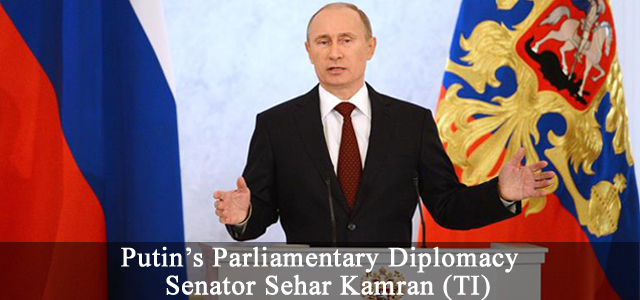By Senator Sehar Kamran (TI)
February 13, 2016
 “Terrorism can never be accepted.
“Terrorism can never be accepted.
We must fight it together, with methods that do not compromise our respect for the rule of law and human rights, or are used as an excuse for others to do so.”
Anna Lindh
Former Swedish Minister for Foreign Affairs.
Terrorism has now long been recognised as a cataclysmic phenomenon and the greatest threat to world peace in a very long time. Over the past two decades alone, it has been responsible for creating conflicts not only inside states but also between states. The controversial elements of ‘state-financing’ of terrorism and a continuation of proxy wars has put a significant question mark on the ability of the international community to come together as one to address this menace. Recognising the evil of ‘terrorism’ as an international/inter-state issue, therefore, lies at the core of our ability to devise effective policies to counter it today.
In this context, a momentous step was taken on November 18th 2015, when the Russian Parliament launched an international appeal for all Parliaments and International Parliamentary Organisations to come together in a joint effort to better combat the menace of terrorism.
While there have undoubtedly been many calls for increasing international cooperation and stepping up efforts to counter this menace, this particular appeal is unique, as for the first time it calls for concrete inter-parliamentary collaboration and action as a premise for international collaboration in this regard. The appeal is a milestone in itself, highlighting how far global counter-terrorism efforts have come from unilateral and multilateral interventionism to now be calling for all collective CT and CVE initiatives to be rooted within a politico-legal framework.
The appeal for parliamentary diplomacy condemns all acts of terrorism that have affected not only the lives of those within the Russian Federation, but also the multitudes affected in Syria, Iraq, Afghanistan, Paris and elsewhere. The nature of many of these recent terrorist attacks, and their ownership by extremist groups that are both home-grown and international has only reaffirmed just how much terrorism is a multilateral problem, as well as how political manipulation of such incidents for temporary gains has only exacerbated the problem and rendered it an ever graver danger for world peace. The Appeal effectively recognises the fact that terrorism is in fact a ‘transnational’ problem, and underscores the fact that any global effort to fight it must be developed within the framework of a ‘representative’ model, for which parliamentary diplomacy is a prime platform.
While the resolution itself is fairly brief, it puts forward a range of principles that will be a useful foundation for any such policy development. A key feature of this diplomacy is that it would allow all issues and policies to be dealt with in a representative manner when, ironically, many international crises are often related to the un-representative character of the world political and economic order. It also highlights the importance for concerted efforts in not only the military and economic domains but also the cyber and social spheres, and identifies inter-state cooperation as a core premise for effectively criminalising terrorism, stressing the fact that the interaction of local parliaments can play a pivotal role in this regard. The appeal emphasises on the need for a crackdown on terrorist outfits in the financial and economic spheres, by ‘expos[ing] and cut[ing] off direct and potential sources of terrorism financing including drug-trafficking, trade of energy and other kinds of resources as well as arms supply channels to the terrorist organisations’.
While the appeal is yet another example of Russia’s firm and principled stance on these issues, particularly in the context of ‘regime change’ via intervention, its credibility is questioned due to its place of origin. In recent years, Russia and its president have found themselves recurrently ostracized in international media, due primarily to the significance of Russia’s role in key developments in the Middle East, North Africa and Eastern Europe. The theme of these attacks relates most often to how the Russian premiere’s personality has and will continue to shape the role of his country in these regions, particularly in the Middle East. In contrast to the traditional US policies of compulsion and blackmail to push ‘client’ states towards reforms, Vladimir Putin’s policies are based on strengthening institutions and reforms. As a result, Mr Putin’s policies in the region have not only received public support, but also helped Russia reaffirm its major powers status.
Furthermore, it is important to consider that associating this positive initiative by the Russian Parliament and its attempt at outreach for a global consensus with mistrustful preconceptions is only counterproductive. In stepping outside the media bubble it becomes clear that Russia is highly critical of the application of double standards, proxy warfare, and unilateralism in international diplomacy. It demands a multilateral democratic world order, and it differs with the west on regime replacement through violent means, advocating instead the strengthening of existing state structures. The establishment and support of the contact group for Afghanistan is an example of its desire to introduce reform peacefully within the existing order. The Parliamentary Appeal is a natural next step of policies geared towards maintaining a stable and prosperous multilateral international order. And it is to this end that Russia recently started advocating such inter-Parliamentary diplomacy from the forum of the SCO that culminated in this formal appeal by the Council of the Federation of the Federal Assembly of Russia.
Pakistan, as one of the hardest-hit victims of terrorism in South Asia and one of the most-experienced countries in dealing with the menace of terrorism, welcomes such inclusive initiatives, and the promotion of an equitable world order rooted in the rule of law, sovereignty and territorial integrity. The creation of such a mechanism of parliamentary diplomacy will greatly assist Pakistan in combatting terrorism, both within its borders and in extending our experience in developing counter-terror military strategies and legislation for criminalising terrorism and related acts to international CT efforts in a comprehensive manner. This can be particularly useful in the context of the worsening situation in Afghanistan since the failure of NATO and Afghan National Army to establish peace in the country. Cross border terrorism on eastern and western borders of Pakistan, the emerging threat of ISIS which is gaining ground in vulnerable areas inside Pakistan (such as Kashmir), and the internal ethnic and sectarian fault lines (whose exacerbation can have international implications) require an international legal framework that is aligned with the domestic policies in order to be productive.
At a time when any number of alliances are emerging in hotspots across the planet, it has become all the more important for all stakeholders to be able to come together in a positive and un-fragmented manner. In this regard, the appeal under discussion is a positive and useful step. It is a call to all legislators across the planet to put aside differences in opinions and policies to develop a framework that will not only reduce such differences but also be effective against this global problem. If all the states can come together within one mutually agreed legal framework, then implementation of CVE and CT initiatives would not only become significantly easier but also far for effective in tackling this global menace.
Same version of the article appeared in The Nation


